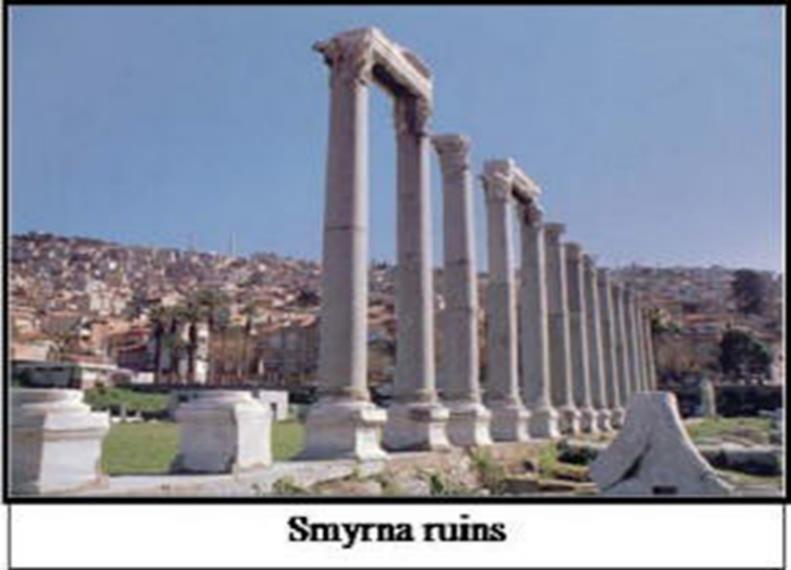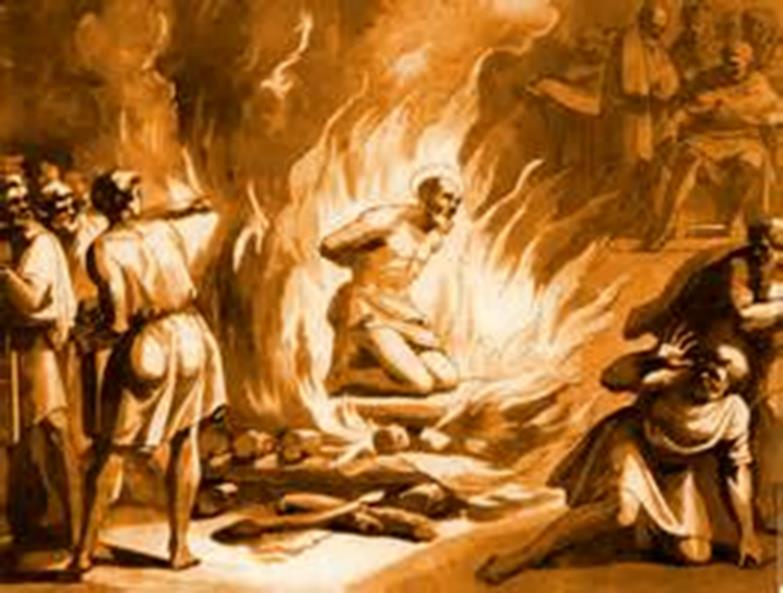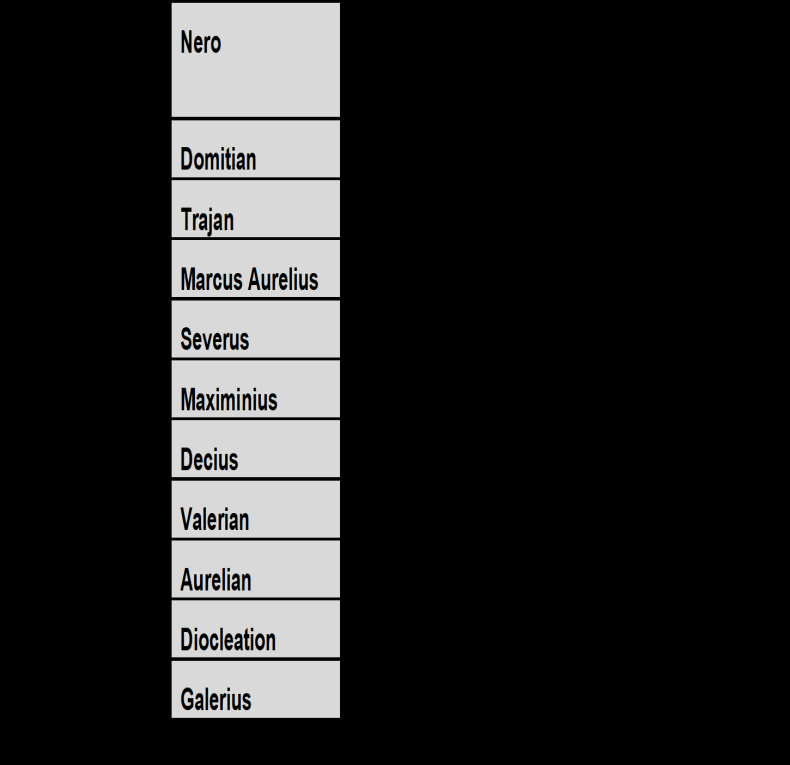Chapter Six
Revelation 2:8-11 KJV: 8 And unto the angel of the
church in Smyrna write; These things saith the first
and the last, which was dead, and is alive; 9 I know
thy works, and tribulation, and poverty, (but thou art
rich) and I know the blasphemy of them which say
they are Jews, and are not, but are the synagogue of
Satan. 10 Fear none of those things which thou shalt
suffer: behold, the devil shall cast some of you into
prison, that ye may be tried; and ye shall have
tribulation ten days: be thou faithful unto death, and
I will give thee a crown of life. 11 He that hath an
ear, let him hear what the Spirit saith unto the
churches; He that overcometh shall not be hurt of
the second death.
The Church at Smyrna
The next church we come to is the church at Smyrna.
The church at Smyrna represents the time from
approximately 100 A.D. to the beginning of the fourth
century. During this time, the church underwent
intense persecution at the hands of the Roman
government. We can see from verse nine of chapter
two that this church was in tribulation and extreme
poverty.
Verse ten lets us know that they were suffering for
their faith, and Jesus tells them that they will be cast
~ 57 ~

Church History Through the Trail of Blood
into prison and tribulation ten days. During the time
in history that this church represents there were ten
waves of persecution under ten different Roman
emperors, which ended in the year 313 A.D. when
Constantine merged the church with the Roman
government.1
1
http://sacred-lion.blogspot.com/2009/01/look-at-seven-
churches-of-revelation-as.html
Thirty-five miles to the north of Ephesus is the port
city of Smyrna. A city founded by the Hittites dating
back to 2000 B.C., the Greeks “Sea peoples”
conquered the land about 1100 B.C. The city was part
of the Ionian league of Greek city states. The city was
completely destroyed in 600 B.C. by the Lydian King
~ 58 ~
Church History Through the Trail of Blood
Alyattes II. The city was rebuilt by Alexander and his
generals Lysimachus about 300 B.C. The city was
conquered by the Romans and in 193 B.C. a temple
was erected to the deity of Rome. The temples of
Zeus and Cybele were linked by a mall said to surpass
all others.
Smyrna was a wealthy port city, which the flow of
trade entering and leaving Asia Minor utilized. The
city was controlled by guilds, those refusing to join or
denied membership would be unable to enter in
commerce.
In the message to the church of Ephesus Jesus
described Himself as holding the seven stars and
standing in the midst of seven lampstands. Here
referring back to the first chapter, Christ describes his
nature and character.
To those in Smyrna looking at the horrors of death, Christ
promises victory over death. He is alive and not dead.
This is the model church of persecution and represents
the age of persecution. The church of Smyrna was
marked by tribulation.
The guilds controlled the marketplace and unless you
were willing to participate in the worship of the gods,
you could be excluded. The Christians refused and
suffered tribulation for their faith.
~ 59 ~

Church History Through the Trail of Blood
One of the most famous martyrs of Smyrna is
Polycarp, (Death 156 A.D.) the Bishop of Smyrna,
who died at the age of 86 refusing to deny Christ.
Polycarp
~ 60 ~

Church History Through the Trail of Blood
Polycarp died by burning at the
stake
Poverty: The word used does not just mean poor, but
abject poverty. The Greek word, Ptocheia means
beggary, being destitute of riches or abundance. The
Christians of Smyrna faced persecution and lost their
businesses and possessions because of faith in Christ.
The Jews of Smyrna were extremely hostile to the
Christians of the city. In the Polycarp’s martyrdom
they retrieved the wood for his burning. Jesus calls
the Jews of Smyrna blasphemous not only because of
the persecution of the Christians, but also for their
ungodly alliance with the pagans of Smyrna.
Synagogue of Satan: The Synagogue of Smyrna was
in league with Greek gods of Smyrna in opposition to
the Christians. God allowed Satan to test His
~ 61 ~
Church History Through the Trail of Blood
Church. During this period, the Church grew like
never before. The greatest period of church growth
was during this period of persecution. The more the
church was persecuted the faster it grew.
The period of persecution was to last for a specified
period. The persecution during this period lasted
from the time of Domitian in A.D. 96 until Diocletian
and his successor Galerius in A.D. 311.
Depending on when counting begins, 10 or 11 periods
of persecution can be located during this period. If we
start at Domitian, John was on Patmos because of
Domitian, then there are 10 periods, with Nero as the
start there are 11 periods.
~ 62 ~

Church History Through the Trail of Blood
http://www.truthnet.org/Christianity/revelation/Revelation2/
In death, the Christian martyr demonstrates to the
world the victory we have in Christ. We do not have
to fear death, because one second after death we are
in the Lord’s presence for eternity. For this reason,
Paul could boldly say, 21 For to me, to live is Christ,
and to die is gain. 22 But if I live on in the flesh, this
will mean fruit from my labor; yet what I shall
choose I cannot tell. 23 For I am hard pressed
between the two, having a desire to depart and be
~ 63 ~
Church History Through the Trail of Blood
with Christ, which is far better. 24 Nevertheless to
remain in the flesh is more needful for you.
Philippians 1:21-24
Some of the Martyrs
Polycarp: There is some question whether Polycarp
was 86 years old when he was martyred or whether he
had been a Christian 86 years. His words are, "86
years I have served him, and he never did me any
injury" ( Martyrdom of Polycarp 9). Either way, there
is strong tradition that he was appointed Bishop of
Smyrna by the apostle John. It is believed that
Polycarp was a disciple under the Apostle John.
(http://www.christian-history.org/polycarp.html)
Ignatius of Antioch: Ignatius was also a disciple of
the Apostle John. He was the Pastor of the church at
Antioch in Syria when he was taken to Rome and
martyred. Some sources say that he was burned at the
stake, like Polycarp, while others say that he was
killed by wild beasts in the Roman Coliseum. While
he was no doubt a very dedicated and true disciple to
the truth of God’s Word, the Catholics have also taken
him and probably much has been taken contrary to
what he really was.
Justin Martyr: According to the sources of my
research, Justin Martyr was not a pastor of any church.
He was born of pagan parents in a Jewish
~ 64 ~
Church History Through the Trail of Blood
environment. He was supposedly saved near
Ephesus. He was an apologist, a defender of the truth.
He was a teacher and writer. He founded a school in
Rome to teach Christianity. Because of this, he was
martyred.
Roman Persecution
Using the best methods possible, the best evidence
indicates at least 6-million Christians were martyred
over 250 years, at most 18-million martyrs over 250
years, and at mid-range, about 12-million martyrs
from AD 64 - to 313 over 250 years.
Names are not always given but the above tells us that
God’s people suffered much during this time period.
Conclusion to Chapter Six
There is one other church of the seven churches that
falls within this first time period under consideration
by Dr. Carroll. That church is the church at
Pergamum. Before we consider that church, I want us
to look at some of those who gave their lives for the
Lord during this time period.
After that we will consider the Church at Pergamum
and then return to Dr. Carroll’s text.
~ 65 ~
Church History Through the Trail of Blood
Church History Through the Trail of Blood
Chapter Seven







